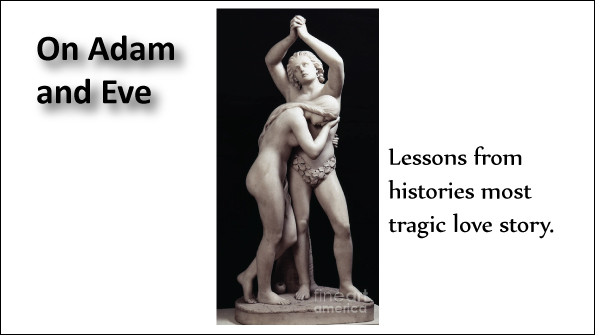By Tyson Thorne

As we look at what makes a “good” relationship it only makes sense to examine the world’s first romance. This will be looked at as a series of observations about their relationship that we can learn from Genesis chapter 2.
The first notable observation is God’s reaction to Adam not having a mate. The creator of the universe himself said, “It is not good for man to be alone.” Man needed a helper
The second is equally obvious though not as directly stated. As we pointed out in “Beyond Webster: The meaning of marriage”, God created Adam and Eve not Adam and Steve. This is an inferred disapproval of homosexuality; if you would like a more direct condemnation look to Romans chapters one and two.
Third, while it was “not good” for man to be alone, after the creation of Eve God looks across all of his work and proclaims it is now “very good.” One must conclude then that God is pleased when men and women have right relationships with each other.
Looking back at yesterday’s post we can start asking questions about Adam and Eve’s relationship. Did their relationship enable them to be more productive? While Adam was no slouch and worked hard in the Garden (Genesis 2.15), he still needed a “helper.” Indeed, God created for Adam a woman who would enable him to be even more productive.
Did their relationship enable them to love more people than they ever thought possible? While there were no other people to grow in their love for, I think it probable that they would not have known about aspects of love without the aid of a partner. Their love grew in regard to each other and in their relationship with God.
God created them for a synergistic relationship. This is also reflected in His command to them in Genesis chapter one, “be fruitful and multiply.” God did not say “be fruitful and add to the Earth,” he used the word multiply.
In verse 25 of chapter two we discover that they were not ashamed of themselves, or of each other. And this is indicative of all “good” relationships, neither party being ashamed of the other.
Their relationship was “good” in every respect, until a snake came along. We don’t know much about this creature; tradition tells us that this was the devil, but the Scriptures only refer to him as the craftiest creature in the garden. Neither do we know his motive for deceiving Adam and Eve. Perhaps, being the craftiest creature, he thought to put his talents to the loftiest test: to deceive the two creatures God had given total dominion to. Perhaps the snake was Lucifer, or at least one of his emissaries, in which case the motive is simple: to attempt to destroy Gods image on Earth. But whoever the snake was, whatever his motivation, he caused a break in the relationship between God and man, and between man and woman.
We have a wonderful picture of the first couple before the fall. They were not ashamed of each other (2.25), they cleaved to each other (2.24), they were made for each other (2.15-.23). While Adam was off naming animals, Eve was collecting fruits and vegetables for meals. They gardened together. Their love for each other has never been equaled.
Yet we have a very different picture of them after the fall. Starting in chapter three verse eight we see the Lord God walking through the garden, calling out to Adam, wondering where he had gotten to. And Adam was, for the first time in his life, very much afraid. He was also very much ashamed, as we can see in his reply to God, “We are over here, in the bushes. We are hiding because we are naked.” And the Lord God confronted man with his sin. “Who told you you were naked?” Asked God. “Did you eat of the forbidden tree?”
Of course they had. God knew it, they both knew it, the snake knew it, and now I imagine, every creature in the garden knew it. Sin had entered the world, but instead of owning up to it and being the man God created him to be, Adam passed the blame and the responsibility on to his wife. Surprised by Adam's inability to take responsibility for their actions, as he had always done in the past, feeling betrayed and suddenly very alone in the world, Eve followed Adam’s example, and passed the buck to the snake. But God saw through it all, and judgment was carried out against all three of them.
Relationships have been tarnished ever since. And it is for this initial failing that we now find it hard to forgive those who wrong us; why it is hard to love unconditionally; why it is hard to listen to others as our own thoughts crowd our mind; why it is hard to encourage one another; why it is hard to serve and support our fellow man – especially when he is seen as “the competition;” why it is hard to accept others for who they are and to intercede on their behalf without mixing in parts of our own agenda; and why it is hard to trust them with our darkest sins for accountability? We lost much through the fall.
Click for the next article in this series: http://www.think-biblically.com/10-lucubrations/45-overcoming-temptation
|
|
|
